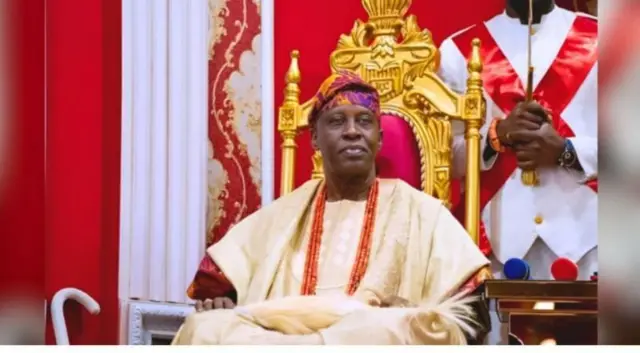
𝐖𝐞’𝐥𝐥 𝐧𝐨𝐭 𝐚𝐥𝐥𝐨𝐰 𝐚𝐧𝐲𝐨𝐧𝐞 𝐮𝐧𝐝𝐞𝐫𝐦𝐢𝐧𝐞 𝐒𝐨𝐮𝐧’𝐬 𝐭𝐡𝐫𝐨𝐧𝐞, 𝐘𝐨𝐫𝐮𝐛𝐚𝐥𝐚𝐧𝐝 𝐒𝐨𝐜𝐢𝐨-𝐜𝐮𝐥𝐭𝐮𝐫𝐚𝐥 𝐆𝐫𝐨𝐮𝐩 𝐖𝐚𝐫𝐧𝐬
A Yoruba socio-cultural group, Olofin-Adimula, has issued a caution against any attempt to undermine the Soun of Ogbomoso’s throne, emphasizing its significance as one of the most revered stools in Yorubaland.
This was contained in a statement which was signed by the Convener of the group, Comrade Akinpelu Adesina, and made available to newsmen in Ibadan on Tuesday, expressed its unwavering commitment to protecting the dignity and sanctity of traditional institutions in Yorubaland.
Particularly, the Olofin-Adimula reaffirmed its support for the current Soun of Ogbomosoland, Oba Ghandi Afolabi Olaoye, acknowledging his leadership and developmental initiatives for the ancient Ogbomoso town.
The group expressed concerns over disrespectful ultrances and activities of certain religion leader against Oba Laoye.
According to the group, the Soun’s throne is not only a symbol of authority and tradition in Ogbomoso, but also an integral part of the cultural and historical identity of the Yoruba people.
The group highlighted that any actions that might desecrate or undermine the throne would be met with strong resistance, as the community holds the stool in the highest regard.
In the statement, Olofin-Adimula vowed to mobilize youths and traditional rulers against any external forces that may want to hide under religion to destroy Yoruba traditional institutions and thrones.
According to the statement, Olofin-Adimula is not a self-determination group with Yoruba nation agenda but focuses on the protection of Yoruba tradition and culture.
The group commended Yeye Dara Kowe for her efforts to protect the Yoruba traditional institutions, calling on other well-meaning Yoruba sons and daughters, both home and abroad to join in the efforts to protect our tradition.
The group expressed admiration for Oba Ghandi Olaoye’s vision for the future, particularly his ambitious 25-year development agenda for Ogbomoso, which has already garnered widespread attention and praise.
This comprehensive plan, which aims to address key areas such as infrastructure, education, health, and economic empowerment, is viewed as a strategic blueprint for transforming Ogbomoso into a thriving urban center that will serve as a model for other communities in the region.
According to the statement, “We salute Oba Olaoye for his foresight and dedication to the betterment of Ogbomoso. His 25-year development agenda is not only visionary but also necessary for the growth of our community.
“We urge the king to continue fostering harmonious relationships with other traditional rulers within the zone to further accelerate development and ensure peace and unity across the region.”
The group underscored the importance of collaboration among monarchs in Yorubaland, suggesting that a cooperative approach would be instrumental in tackling various developmental challenges and enhancing regional cohesion.
Olofin-Adimula noted that by working together, traditional leaders could address issues such as youth unemployment, infrastructure gaps, and social welfare, which would ultimately benefit all communities in the area.
The group called on all stakeholders, including government officials and residents, to support Oba Olaoye’s efforts in ensuring the preservation of Ogbomoso’s heritage while also pursuing sustainable development. In their statement, they also commended the monarch’s tolerance, emphasizing that his leadership style has promoted peace and inclusiveness within the community.
The statement concluded by reaffirming the group’s commitment to protecting the sanctity of the Soun’s throne, urging all individuals and organizations to recognize the historical and cultural significance of the stool.







